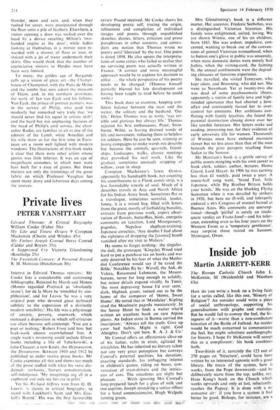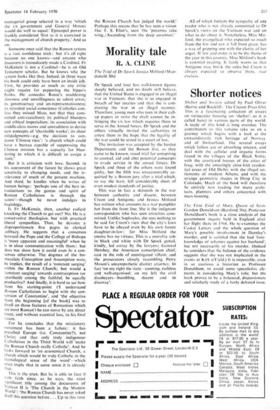Inside job
Martin JARRETT-KERR
The Roman Catholic Church John L. McKenzie, SJ (Weidenfeld and Nicolson 63s)
How do you write a book on a living faith for a series called, like this one, 'History of Religion'? An outsider could write a piece of social anthropology, supporting his generalisations with graphs and statistics. But he would fail to convey the feel, the liv- ingness of it—worse than a non-combatant historian of the Battle of Jutland. An insider would be much concerned to communicate the feel, but might substitute autobiography for history. I hope Fr McKenzie will accept this as a compliment: his book combines both.
Two-thirds of it, certainly the 123 out of 270 pages on 'Structure', could have been written by an interested agnostic with a good library. He treats of the system, how it works, from the Pope downwards—and he deliberately starts from the top, unlike, say. Hans Kung's book on the Church which works upwards and only at last, reluctantly. reaches the Papacy. It is done with a no nonsense air: if you have a system it had better be good. Bishops, for instance, are a
managerial group selected in a way 'which the us government and General Motors would do well to equal.' Episcopal power is frankly considered 'first as it is exercised in the management of church property.' And so on.
Someone once said that the Roman system is a vast confidence trick : but it's all right because no one knows—and anyone who discovers is immediately made a Cardinal. Fr McKenzie is not a Cardinal—he is an Old Testament scholar. But he knows why the system looks like that. Indeed, in three ways his book could only have been an inside job. First, he provides as much as any critic might require for peppering the hippo's flanks. He concedes Rome's maddening slowness and unwillingness to admit error; its gerontocracy and un-representativeness; its retarded social conscience (Catholics con- fess they missed Mass, not that they com- mitted anti-racialism); its political blunders and ethical imperialism; its association with middle-class mores and unreadiness to devise new concepts of 'charitable works'; its sheer misjudgments—e.g. the decision to con- demn 'Chinese rites': 'a church which could have a bureau capable of suppressing the Chinese mission has a capacity for blun- dering to which it is difficult to assign a limit.'
But it is criticism with love. Second, in his assessment of the future he shows great sensitivity to changing needs, and the ir- relevance of much of the present machine. And third, he kindles when he writes of human beings: 'perhaps one of the best in- troductions to the genius and spirit of Roman Catholicism is through the saints'—though he never indulges in hagiology.
Is Fr McKenzie, then, another radical knocking the Church to get out? No. He is a conservative theologian, but with practical liberal sympathies. Thus, he devotes a disproportionate five pages to clerical celibacy. He suggests that a consensus betweeri the Pope and the College of Bishops is 'more apparent and meaningful' when he is in close communication with them : but does not show how it could even be a con- sensus otherwise. The dogmas of the Im- maculate Conception and Assumption were, he implies, the result of a 'constant surging' within the Roman Church; but would a 'constant surging' towards contraception (or apartheid) among the faithful, be equally productive? And finally, it is hard to see how from his starting-point (`I understand Roman Catholicism to begin with the con- version of Constantine', and 'the objective from the beginning [of the book] was to dwell on those features of Romanism which are most Roman') he can move by any direct route, and without essential loss, to his final vision.
For he concludes that the missionary movement has been a failure: it has preached Europe (i.e. Constantine?), not Christ; and that only truly indigenous Catholicism in the Third World will 'make the Roman Church really Catholic'. And he looks forward to 'an ecumenical Church, a church which would be truly Catholic in the etymological sense of the word'—which must imply that in some sense it is already
that.
This is the crux. But he is able to face it with faith since, as he says, the most significant title among the documents of Vatican II is 'The Church in the Modern World': 'the Roman Church has never asked itself this question before ... Up to this time the Roman Church has judged the world.' Perhaps this means that he has seen a vision like T. S. Eliot's, seen 'the 'potamus take wing,/ Ascending from the deep savannas.'



































 Previous page
Previous page